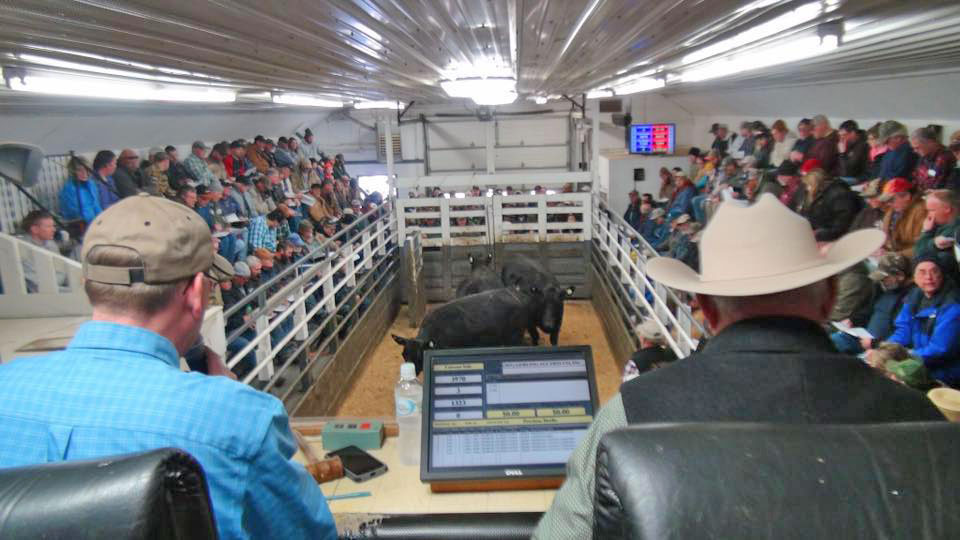A recent land swap with the city of Lanesboro has given Lanesboro Sales Commission the space to build a new structure to house cattle in exchange for a former parking lot. The newly built structure includes a new vet facility. According to Joe Nelson, it had always been his goal to get land to put a nice structure near the original Lanesboro Sales Commission buildings. This is now his “dream come true!” The new building took three hours off a recent sales day – the animals were handled more efficiently and the new, well-ventilated building was so much more friendly and comfortable for both the workers and the animals.
Lanesboro Sales Commission was originally started by Paul Evanson, Walter Ode and Duffy Lewis in1947. At the time, it was hailed as one of Lanesboro’s largest industries and remains so. The community lacked a market auction at the time and animals had to be shipped long distances to be sold. With the establishment of the market auction in Lanesboro, farmers were able to sell right at their back door. Lanesboro’s river and railroad access provided transportation and power to the area farmers and settlers as they established themselves in the area.
At its inception, business was done with pen and paper. Most of the animals came from local farms. It has now evolved into farmers buying over the internet from their tractors. Everything is done electronically in the business office. Now it’s not uncommon for feeder cattle to be shipped via semis to Nebraska and all over the country.
Today people come from as far away as 200 miles to attend the auctions in Lanesboro and its other location in Decorah, Iowa. The Decorah business is equivalent in size to the Lanesboro location.
Lanesboro Sales Commission has 35 employees and three auctioneers. One hunred fifty thousand head of livestock including sheep, goats, hogs, horses and dairy and beef cattle are bought and sold in a year.
The addition of three drop-off points in Zumbrota, Minn., and Arcadia and Coon Valley, Wis., was a major change that helped small producers. The animals are taken to the locations by the farmers and then are picked up and hauled with other animals to Lanesboro for sale. The farmers can save both time and money using the drop-off points. This has helped Lanesboro Sales grow their numbers. According to Nelson, this works very well if you have only a couple animals to sell. The farmer pays $12 to ship his animal on a truck.
There are auction sales two or three times a week; October through February are the busiest times. The auction schedule includes slaughter on Wednesdays, all classes of livestock on Fridays. Special feeder cattle auctions are held occasionally: scheduled special bred cow and heifer auctions are also held. A horse sale is held once a year. At the slaughter auctions, they might have as many as 1,500 cattle.
Since the Lanesboro Sales Commission was established, they have always had food available for the customers. A food stand was located by the auction ring until 20 years ago. At that time the building was enlarged and a separate cafe was added. Brenda’s Stockyard Cafe now offers many food choices for the patrons. “This is a great place to come, enjoy the day, visit and get off the farm!” Joe declared.
When asked what keeps Lanesboro Sales Commission going when many such businesses have folded, Nelson pointed to the dedicated employees, many who have worked there for nearly 50 years. He went on to say it was also the many great customers, noting that some have been coming there for four and five generations. “If you put good people around you, it goes a lot better!” He attributes his success to the really good people around him.
The business is owned by the Joe and Barb Nelson family. A daughter, her husband, a son and two nephews also work in the family business. Joe and Barb live on a farm north of Mabel and have a herd of purebred Angus and Simmental cattle. In his spare time, Joe spends as much time as possible with his five grandkids.
Nelson truly enjoys the fact that the livestock market is competitive. True price discovery happens when an animal is offered at auction. You get top dollar with the whole public deciding exactly what that animal is worth.
In closing, Nelson expressed his gratitude for all the customers buying and selling livestock. He shared that what he loves most is to see a farmer smile and make money!



Leave a Reply